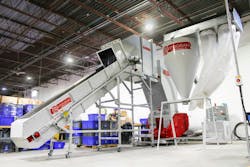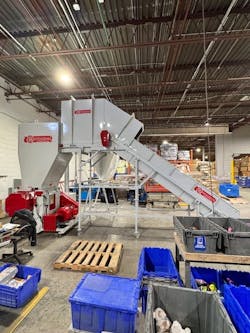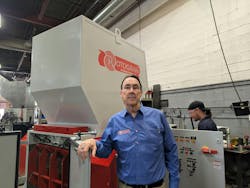Goodwill Ontario invests in Rotogran system to recycle plastics
Key Highlights
Key points in this article:
-
Goodwill Ontario turns landfill-bound plastics into value by installing a custom-configured Rotogran granulation system in London, Ont.
-
The WO2236 granulator runs seven days a week, processing up to 2,000 pounds per hour, with plans to reach 600,000 pounds annually.
-
Recycled output feeds GreenWell Plastics for lumber, pallets and outdoor products, closing the loop on post-consumer plastic.
-
Expansion is on the horizon, with talks underway for a second granulator near Toronto to scale regional plastics recovery.
By Ron Shinn
Nonprofit Goodwill Industries in London, Ontario, had a plastics problem. It had been selling unwanted plastic in bales, but the market disappeared.
“The market sort of fell out and we weren’t getting anyone to buy our plastic,” said Rainer Voigt, vice president of operations and sustainability for Goodwill Industries, Ontario Great Lakes. A majority of plastic items coming in through Goodwill’s donation system that were broken, contaminated or otherwise unrecyclable started going into the landfill.
That’s when a Goodwill transportation supervisor suggested granulating the scrap plastic. He did some initial research, then Voigt's department took over and developed a granulating plan. The team researched equipment, operations and buyers with the hope of monetizing some of the granulated material.
But, Voigt said, “Monetizing was not what we wanted to come out with. It was more about diversion. How could we help our circular initiatives internally and not dump into the landfill.”
Voigt said once Goodwill realized there was actually a market for the granulated plastics it could not sell, “It kind of became a no-brainer. I know that sounds simplistic, but it really did.”
Canadian manufacturer Rotogran International Inc., based in Bolton, Ontario, delivered a custom-configured granulating system just before Christmas 2024. By February, Goodwill was granulating plastic.
Rotogran’s WO2236 delivers high-capacity granulating performance
The system consists of a granulator, feed conveyor, evacuation system and controller.
Goodwill now has three operators plus another employee to move material. All were trained by Rotogran. Currently, the granulator is running eight hours a day, seven days a week.
Capacity of the granulator is 2,000 pounds per hour, but it is not yet being used at full capacity. Goodwill’s plan is to granulate 600,000 pounds of plastic during the first year of operation. Voigt said he believes Goodwill will meet that goal.
There is plenty of unused capacity to scale up the output.
The largest items Goodwill runs through the granulator are plastic totes and storage containers. Items larger than that are cut into smaller pieces.
Clear plastic is sorted from all colored plastic because clear is more valuable. The plastic feedstock is not separated by plastic type, but acrylonitrile butadiene styrene (ABS) and polyvinyl chloride vinyl (PVC) are removed before granulating the rest.
Recycling creates jobs and strengthens Goodwill’s community impact
Voigt said Goodwill did not consider a traditional ROI when it decided to move ahead with purchasing equipment and adding operators.
“We don’t always measure our return on investment in terms of paying for equipment,” he said. “We’re mostly looking at impact. So, the amount of plastic we are diverting from the landfill, how many jobs we create, and the message to the community and our donors is our impact.”
The London site is currently granulating feedstock that comes through its own donation channel. Voigt said he is working with one other Goodwill location to send its plastics feedstock, and some local businesses and a school system are interested in shipping in their waste plastic.
He said talks are underway about a second granulator in a different location nearer to Toronto. London is about 110 miles southwest of Toronto.
System integrates feed conveyor, evacuation and controls for turnkey efficiency
Rotogran President Mike Cyr said the WO2236 heavy-duty granulator was sized to accommodate a wide variety of feedstock.
“We designed it with a back-feed hopper, a custom tallboy-style feeding hopper so it can do whatever comes down the line,” Cyr said.
The Rotogran’s offset cutting chamber design drops material to the side of the chamber instead of the top center. Cyr said this improves efficiency because the plastic material doesn’t bounce around as much inside the chamber.
The WO2236 has a throat size of 22 inches by 36 inches. It has a 75-horsepower motor, four fixed knives and 15 rotor knives.
The Rotogran feed conveyor is equipped with a sound tunnel to reduce noise.
The evacuation system dumps material into gaylords.
Rotogan also builds its own control systems. “Controls are very important because you have to have the conveyor talking to the granulator talking to the blower system. You need to make sure they sequence start and automatically shut off if there is an overload,” Cyr said.
Rotogran specializes in turnkey systems like the one it designed for Goodwill.
Cyr said he did not recommend a shredder to Goodwill. “A granulator is perfectly capable of grinding up all thin-wall things,” he said. “A shredder is not really necessary unless you are grinding extremely thick-wall parts.”
Goodwill’s recycled material is sold to GreenWell Plastics, a plastic lumber manufacturer in Barrie, Ontario. The Goodwill material goes into a variety of GreenWell products, such as outdoor furniture, plastic lumber for decks and pallets used for shipping.
“This partnership is a great example of what’s possible when nonprofits and manufacturers work together to tackle waste at the source,” GreenWell said. “It’s also part of a larger North American trend where Goodwill and other reuse organizations are exploring regional plastic recovery systems.”
About the Author
Ron Shinn
Editor
Editor Ron Shinn is a co-founder of Plastics Machinery & Manufacturing and has been covering the plastics industry for more than 35 years. He leads the editorial team, directs coverage and sets the editorial calendar. He also writes features, including the Talking Points column and On the Factory Floor, and covers recycling and sustainability for PMM and Plastics Recycling.



